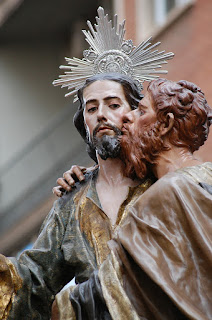In yesterday's post, I looked at the role the
celebrating or otherwise marking Easter might have within Quaker
communities, and in terms of a Quaker community's relationship with
the community in which it is situated. Today, I will continue the
exploration of Easter, but on a more spiritual note. I will look at
the story/stories behind Easter, its history, and what meaning we
might take from it.
As I have explained previously, I think this is
important for Quakers. This is because, where we observe the
traditional testimony concerning times and seasons at all, we tend to
only remember half of it. No day is more holy, or more significant
than another, which is important. However, the early Friends did not
reject the lessons and meaning of holy days, just their fastening to
a particular day. The same argument applies to liturgical seasons.
Thus, it would be taught that we do not observe Easter, or other
holidays, but that we should remember the lessons and meaning of
Easter all through the year.
Now, of course, with the cultural pervasiveness of
many holidays, it is (in my experience) a rare Quaker that refuses
any observance of the holidays at all, yet I see little deep
engagement with the meanings of these festivals, whether at that time
of the year or otherwise.








